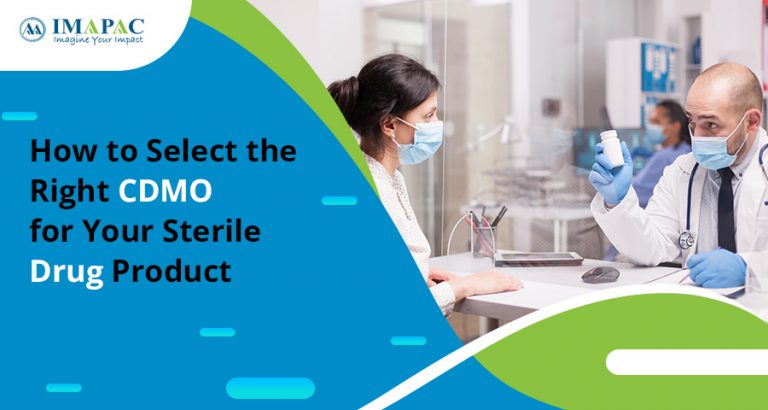How to Select the Right CDMO for Your Sterile Drug Product?
To widen the manufacturing of your sterile products, you need to find out a trustworthy and high-principled biologics CDMO. Your sterile medicine product’s production must be scaled up from clinical to commercial size, which is a difficult procedure with numerous elements to take into account. This is especially true when it comes to the aseptic manufacturing techniques that are being scaled up more frequently in the pharmaceutical sector.
A rigorous balancing act between technical proficiency and cultural fit is required when choosing the ideal manufacturing partner to take your product from the clinical stage to commercial production. The flexibility and collaboration required to scale up a novel medicine product, for instance, may not be provided by many contract manufacturing organizations (CMOs) who focus on high-volume items. Other contract partners might provide excellent flexibility and cooperative staff, but they might lack the facilities or aseptic processing skills necessary for your product. When choosing a manufacturing company, science and talent must both be carefully considered.
Commercial-scale sterile production has the perfect partner out there, but finding them requires understanding what to look for in a contract development and manufacturing company (CDMO). In this blog, we will examine the reasons behind the difficulty in locating a sterile manufacturing partner and emphasise the crucial criteria to consider when choosing a biologics CDMO partner for your project’s requirements.
Where Manufacturing of Sterile Is Required
Several administering methods call for sterility. These consist of
- Injection
- Ophthalmic
- Inhalation
- Otic
The demand for sterile manufacturing has been rising steadily in recent years. 40% of new product approvals in 2020 were for injectable pharmaceuticals, such as cancer treatments and biologics, and more than 50% of the products in the innovation pipeline were injectable drugs. Over the past five years, clinical projects for ocular medicines have increased by 100%.
Given this, it should come as no surprise that finding sterile manufacturing partners is difficult for companies developing new drug products, particularly when scaling up from a trial to a commercial level. Not all CDMOs have the capacity for sterile manufacturing that would be required to complete a new commercialization project or the adaptability to accept smaller batch sizes for novel goods.
Significant Factors To Take Into Consideration While Choosing A Sterile Manufacturing Partner
It’s crucial to examine a number of factors when choosing a partner to ensure the efficient and effective commercialization of your product. These factors include:
-
Quality
When choosing a partner, quality is a major factor, but when it comes to sterile production and proving compliance with strict international regulatory requirements, it is extremely essential. To ensure that your product is entirely compliant with all applicable laws in all the major markets where you intend to sell it, a biologics CDMO should be thoroughly knowledgeable about and an expert in those laws.
A good CDMO should be able to show you that it has a plan in place for preserving a high level of quality over time. This implies that the CDMO needs to have mechanisms for continuous improvement, a quality manual, and personnel training. A production team with insufficient training or an inability to address problems like deviations can be expensive or even fatal to a drug product.
To provide you confidence in the paperwork they give you for regulatory bodies, your CDMO should also be able to show that they have systems in place to guarantee and demonstrate data integrity.
And finally, a manufacturing partner should have a culture of accountability. People who work in accountable organisations show a high level of ownership and act and think in ways that support organisational goals. The success of a project is significantly impacted by an accountability culture, which also significantly strengthens the client-CDMO connection.
-
Required Capacity and Supply Security
It is essential to make sure you choose the proper-sized CDMO for your sterile project’s requirements. The CDMO may not have the specialised manufacturing capacity or the safe supply chain necessary to scale and deliver the numbers you demand on time if it is too small. If they are too big, they can find it challenging to give your project the attention it needs, which could cause delays.
You must take the following factors into account while choosing the ideal CDMO size:
- Are the required batch sizes produced by the CDMO?
- Is the CDMO equipped with a dedicated, ready-to-use sterile capacity to meet deadlines?
- Does the CDMO provide a unique, customised approach?
- Does the CDMO provide supply security?
- Does the CDMO care about your success in the long run?
Regardless of your batch sizes or the size of your business, an ideal CDMO offers a staff that cares as much about your product as you do, in addition to having the capacity and supply chain security to satisfy your needs.
-
Flexibility and Transparency
Whether they are caused by the procurement of raw materials, the scaling up of production processes, or the complexity of qualifying equipment, obstacles are present in every manufacturing project. When it comes to their internal procedures, infrastructure, and capacity, some CDMOs are stiff and inflexible and occasionally need to disclose their restrictions or potential difficulties.
Nevertheless, a partner must be open and adaptable if commercialization is to be effective. A good CDMO will be honest with you about these difficulties and will work with you to come up with inventive solutions to get the project finished on time and without incident.
In terms of project schedules, your CDMO should also be reasonable, especially when it comes to sterile processing. A project timeline is probably false if it seems too wonderful to be true.
-
Risk Reduction
It is critical to assess a CDMO’s aseptic process simulation (APS) strategy in order to make sure the partner can reduce the risk for sterile projects. Customers may “plug in” various sterile production projects quickly and effectively with CDMOs that provide a “bracketed” range of compounding processes, container closure systems, and fill volumes, saving them time and money. In addition to using dedicated equipment, single-use solutions can improve productivity and save manufacturing lead times.
To find out if the biologics CDMO has successfully completed any pre-approval inspections, find out if the facility has undergone FDA inspection (PAIs). A positive PAI demonstrates the CDMO’s capacity to produce a drug product with accurate and comprehensive data. Examine pertinent information from previous PAIs to see if the CDMO’s PAI history has any bearing on your project.
It is crucial to comprehend a CDMO’s history of tech transfers and work on comparable projects in addition to looking at FDA inspection history. This will show whether the company can solve problems and has the expertise to complete your project successfully.
-
The Right Fit
And finally, while choosing a partner for sterile manufacturing, consider your relationships. Along with adhering to the aforementioned parameters, choosing a CDMO that you are confident will share your objectives and function as an actual member of your team is crucial.
Your interactions with business development staff are where it all begins; they should be receptive and transparent while discussing your concept. The CDMO representative who handles your request should be committed to learning about your needs and translating them into a feasible project plan.
A good biologics CDMO should be invested in the success of your project. Throughout a project, team members should be responsible for fulfilling milestones and offering prompt, correct responses to inquiries or complaints.
Liked this piece of information? Stay tuned for more!





